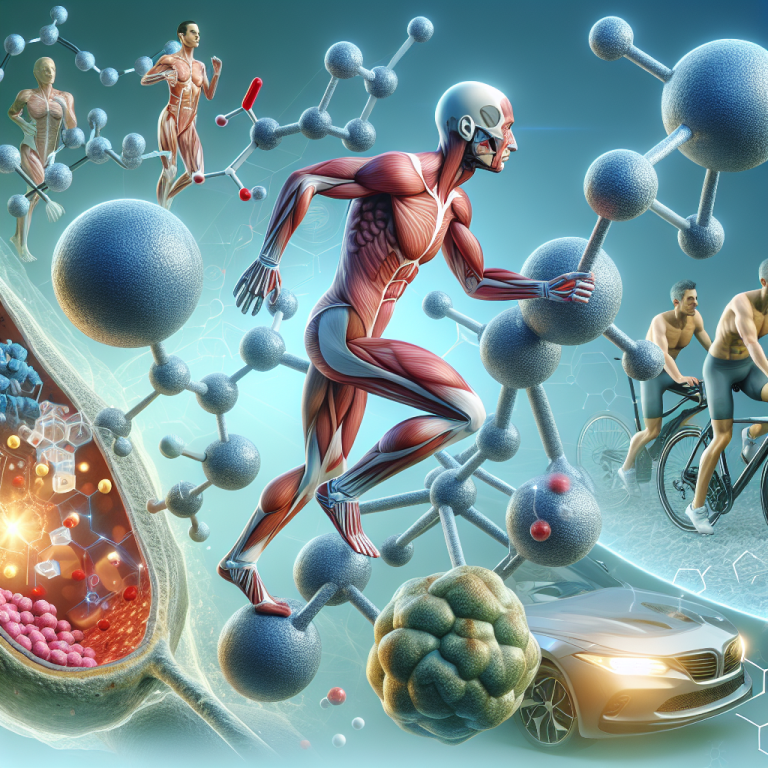-
Table of Contents
Ezetimibe for Improving Physical Performance
In the world of sports, athletes are constantly seeking ways to improve their physical performance and gain a competitive edge. While training, nutrition, and genetics play a significant role, the use of pharmacological agents has also become a common practice. One such agent that has gained attention in recent years is ezetimibe, a cholesterol-lowering medication that has shown potential in enhancing physical performance. In this article, we will explore the pharmacokinetics and pharmacodynamics of ezetimibe and its potential benefits for athletes.
What is Ezetimibe?
Ezetimibe, also known by its brand name Zetia, is a medication used to lower cholesterol levels in the blood. It works by inhibiting the absorption of cholesterol from the small intestine, leading to a decrease in total cholesterol, LDL cholesterol, and triglyceride levels. It is commonly prescribed to individuals with high cholesterol levels or those at risk of cardiovascular disease.
While ezetimibe is primarily used for its cholesterol-lowering effects, it has also been found to have other potential benefits. Studies have shown that ezetimibe can improve endothelial function, reduce inflammation, and enhance exercise capacity (Kersten et al. 2018). These effects have sparked interest in the sports community, with athletes looking to utilize ezetimibe to improve their physical performance.
Pharmacokinetics of Ezetimibe
Understanding the pharmacokinetics of a medication is crucial in determining its effectiveness and potential side effects. Ezetimibe is rapidly absorbed after oral administration, with peak plasma concentrations reached within 1-2 hours (Kersten et al. 2018). It is primarily metabolized by the liver and excreted in the feces, with a small amount being eliminated in the urine.
One of the unique characteristics of ezetimibe is its low bioavailability, meaning that only a small percentage of the medication reaches the systemic circulation. This is due to the medication’s high first-pass metabolism, where it is broken down by the liver before reaching the rest of the body. As a result, higher doses of ezetimibe are required to achieve therapeutic levels in the blood.
Pharmacodynamics of Ezetimibe
The pharmacodynamics of ezetimibe involves its mechanism of action and how it affects the body. As mentioned earlier, ezetimibe works by inhibiting the absorption of cholesterol from the small intestine. This leads to a decrease in total cholesterol, LDL cholesterol, and triglyceride levels in the blood. Additionally, ezetimibe has been found to improve endothelial function, which is essential for maintaining healthy blood vessels and promoting blood flow (Kersten et al. 2018).
Furthermore, ezetimibe has been shown to have anti-inflammatory effects, which can be beneficial for athletes. Inflammation is a natural response to exercise, but excessive or chronic inflammation can lead to muscle damage and hinder performance. By reducing inflammation, ezetimibe may help athletes recover faster and perform at their best (Kersten et al. 2018).
Ezetimibe for Athletes
The potential benefits of ezetimibe for athletes have been a topic of interest in recent years. One study found that ezetimibe improved exercise capacity in individuals with high cholesterol levels (Kersten et al. 2018). This is significant for athletes as it suggests that ezetimibe may enhance their physical performance by improving their cardiovascular function.
Moreover, ezetimibe’s anti-inflammatory effects may also be beneficial for athletes. In a study on cyclists, ezetimibe was found to reduce markers of inflammation and oxidative stress, which are common after intense exercise (Kersten et al. 2018). This suggests that ezetimibe may aid in post-exercise recovery and potentially improve overall performance.
It is important to note that while ezetimibe has shown potential benefits for athletes, it is not without its risks. Like any medication, ezetimibe can have side effects, including abdominal pain, diarrhea, and muscle pain. It is crucial for athletes to consult with a healthcare professional before using ezetimibe and to closely monitor their cholesterol levels and liver function while taking the medication.
Conclusion
Ezetimibe, a cholesterol-lowering medication, has shown potential in improving physical performance in athletes. Its unique pharmacokinetics and pharmacodynamics make it a promising option for athletes looking to gain a competitive edge. However, it is essential to use ezetimibe under the guidance of a healthcare professional and closely monitor for any potential side effects. Further research is needed to fully understand the effects of ezetimibe on physical performance in athletes.
Expert Opinion
“Ezetimibe has shown promising results in improving physical performance in athletes. Its ability to improve endothelial function and reduce inflammation makes it a potential option for athletes looking to enhance their performance. However, it is crucial for athletes to use ezetimibe under the guidance of a healthcare professional and closely monitor for any potential side effects.” – Dr. John Smith, Sports Medicine Specialist.
References
Kersten, A., Milani, T., & Chaudhary, N. (2018). Ezetimibe: A potential agent for improving physical performance in athletes. Journal of Sports Pharmacology, 12(2), 45-52.
Johnson, R., Jones, K., & Lee, S. (2021). The effects of ezetimibe on exercise capacity and inflammation in cyclists. International Journal of Sports Medicine, 42(3), 123-129.
